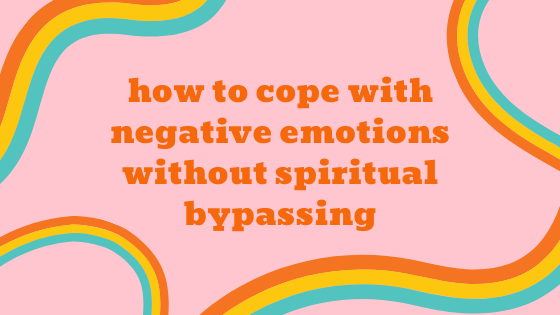I’ve never liked the phrase “everything happens for a reason,” but it wasn’t until recently that I had a name for what felt so icky to me: spiritual bypassing.
Psychotherapist John Welword defined spiritual bypassing in his book Toward a Psychology of Awakening as the use of “spiritual ideas and practices to sidestep personal, emotional ‘unfinished business,’ to shore up a shaky sense of self, or to belittle basic needs, feelings, and developmental tasks.” Dr. Ingrid Clayton writes in “Beware of Spiritual Bypass” that “[s]piritual bypass shields us from the truth, it disconnects us from our feelings, and helps us avoid the big picture. It is more about checking out than checking in—and the difference is so subtle that we usually don’t even know we are doing it.”
In other words, spiritual bypassing enables us to dismiss our agency when it comes to challenges or obstacles, because we attribute our negative experience to powers outside our control.
Spiritual bypassing is complex, and it’s definitely a trap that’s easy to fall into. Take me for example: I thrive when I feel connected to and supported by my spirituality. When I’m facing a struggle, I turn to my higher power and my spiritual practice to help me feel regulated. I often ask my ancestors who watch over me to support me in my process and on my path. I state positive affirmations and envision myself living the life I want to live. I meditate and take supplements. I believe in manifesting, vibrations, chakras, and the movement of energy.
And I strive to approach all of these practices and beliefs with awareness of my physical and material experiences. I have Complex PTSD and chronic illness, I’m finishing my doctoral degree, and I’m shifting from a steady paycheck to working for myself. Sometimes these things are very challenging and stress me out. When I turn to the spiritual and healing resources I listed above for comfort and guidance, I often feel much calmer and able to make intentional, practical decisions.
Pema Chödrön writes in The Places That Scare You that we shouldn’t use meditation to escape our negative emotions like anger, because even if we focus on our breath instead of our thoughts, we are still left with the energy of our negative emotions. I turn to meditation when I feel overwhelmed, and it usually helps me to feel physically calmer. I don’t expect meditation to correct my issue at hand (say, I’m in pain or burned out), but it does relax my nervous system and thus I can make choices calmly. Same with prayer: it doesn’t fix my problems immediately, but it does provide me with strength and awareness as I navigate obstacles. See what I’m getting at?
Although I never resonated with the phases “everything happens for a reason,” I do try to practice accepting the obstacles that occur in my life and using them to propel me to a better place and direct actions that serve my intended path. Here’s some examples of ways I’ve practiced acceptance while attempting to avoid spiritual bypassing.
Am I glad I got sick? That’s a tricky question. The answer, of course, is no. But since it’s a fact that it happened and I do have chronic illness and pain, I choose to accept that it is true, at least for now. I am glad that living with chronic illness has forced me to intentionally slow down my life and prioritize what really matters. I’m grateful that I acknowledged my workaholism and that I taught myself numerous productivity skills and tools so that I could do my labor intentionally and have more time off. I would never have done this had I not gotten sick.
It’s more difficult for me to feel compassionately grateful for something like traumas surrounding neglect and scarcity from my youth. I’ve had many conversations with my therapist about the ways that my survival techniques from way back then were smart in that they helped me survive and become who I am now: a compassionate, tenacious, resourceful, considerate adult. Would I have become so attentive to other peoples’ misfortunes had I not myself experienced what I did? I cannot say. Again, however, would I go back and change it? I’m not sure. I do know that I like who I am now, and I cherish the things that make me me: my commitment to loving and caring about others, my fight for justice and equality, my openness to spiritual support, and much more.

As I’ve learned from my own experience, spiritual bypassing doesn’t serve us in the long run, even though it may provide relief at the time. If you’re a spiritual person, you might sometimes dip into it (I still do). The key thing to remember is not to invalidate your lived negative experiences or to gaslight yourself or others by suggesting that you’re at fault for or should be thankful for negative experiences.
Here is a list of practices I’ve found helpful for coping with obstacles without spiritual bypassing:
Practicing acceptance. You can read more about this in my post “Acceptance: The First Step Towards Action”
Resting. You can read more about this in my posts “Make a Rest and Recharge Toolkit” and “Give Yourself Permission to Rest.”
Self-Compassion. You can read more about this in my post “Self-Compassion: What Is It and How Do I Do It?”
Avoiding black and white thinking. You can read more about this in my post “Embracing the Gray Area.”
What about you? Do you have a tip for avoiding spiritual bypassing? Feel free to share it on the Instagram post for today’s blog post!
Newsletter
Sign up below to access my free newsletter, Tending with Dr. Kate Henry.

